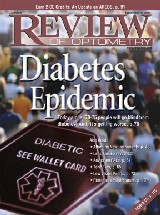In your recent article, The Diabetes Epidemic (September 2003), you stated that those most at risk for diabetes are Latinos, Asian-Americans and blacks. I see many Latinos in my practice and yes, most of them are diabetic or have family members with diabetes. But most of them have never been told to avoid processed grains and to eat only whole grains. No one has told them to avoid white rice and yellow rice, staples in their diet (and in the Asian-American diet), and to eat brown rice or wild rice. Why not? I tell them that, and I think that it is just as important that all optometrists, if they are aware of diabetes in their patients, should instruct them likewise.
Let us not overlook the obvious. We seem to be so engrossed in medical treatment, consequences of the disease if untreated and detection of the disease, that we forget about nutrition. Eating processed grains is like eating sugar. Tell these patients to avoid wheat products (even enriched wheat) found in breads and pasta, and substitute whole wheat or other whole grain products. That is caring for your patient!

As for the AREDS study, that is 10-year-old information. The update only scratches the surface. Nothing is mentioned regarding the retardation of wet AMD, and there is no mention of quantities for prevention vs. treatment of AMD. There is much more current literature available on this now.
E. Michael Geiger, O.D. pure4us@aol.com
Elderly Drivers: Its Not
A Question of Vision
Dont mean to beat the point to death, but I have some comments about elderly people and driving. I received my December 2003 Review of Optometry today and as usual, enjoyed reading it. As I was reading the Elderly Driver Strikes an O.D. letter to the editor, I cant help but believe that most of us are missing the boat on these elderly driver problems.
I believe all O.D.s would agree that poor vision would certainly cause hazards while driving. I dont doubt that many elderly people have vision problems that contribute to accidents. I live in southeastern Florida, where the elderly population is perhaps one of the highest in the United States. Many of the auto accidents caused by the elderly have nothing to do with vision. They have to do with the brain!
Many elderly people lose their ability to properly control a motor vehicle. When an elderly person steps on the gas instead of the brake and goes through a storefront or post office, this is not a vision problem. In my area, it seems this type of incident happens every other week. A friend of my family who is an elderly driver stepped on the gas pedal and plummeted through some bushes into a canal. Luckily, she got out and didnt drown.
Poor reaction time and coordination are responsible for a lot of these problems. Testing vision in the elderly alone is not sufficient to ensure good driving abilities. An actual road test may give the Department of Motor Vehicles a much better indication of driving ability. For that matter, I strongly believe ALL drivers, no matter what their age, should have routine road tests to maintain their drivers license. Many drivers are simply not competentand this is quite obvious in all age groups.
As an instrument-rated private pilot, I must obtain FAA medical exams (including a vision test) every two years. I must also take a checkout ride with an FAA flight examiner every two years to maintain my private pilots license so that the FAA can ensure my safety, both to myself and to others.
Why should driving be any different? It shouldnt be. Ive never come even close to being injured in a single-engine Piper Archer. However, everyday, I believe I come very close to being injured or perhaps killed by incompetent drivers, people who probably have good vision.
So, the bottom line is that vision is, of course, quite important, but its not the entire story, especially with elderly drivers. Elderly drivers and ALL OTHER drivers should be given periodic road tests to maintain their licenses.
Dr. Michael Silverman, O.D., MBSILV@aol.com.

